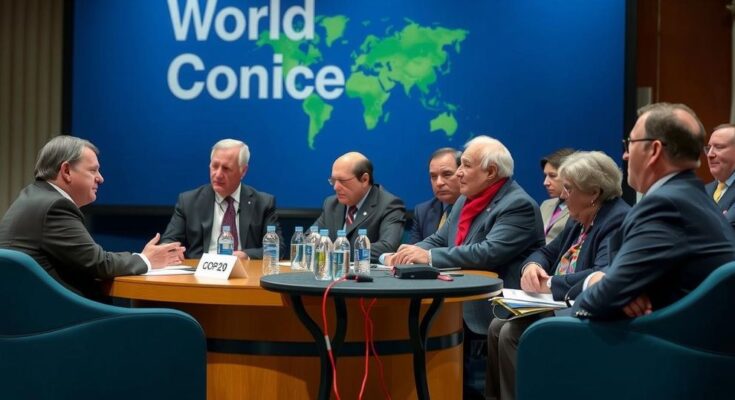At COP29, world leaders remain divided over climate change solutions as new research indicates record-high CO2 emissions from fossil fuels. Calls for urgent action stress the necessity of reaching carbon neutrality by the late 2030s, amidst competing narratives on fossil fuel dependency and sustainability. Discussions on necessary financial commitments also continue to face obstacles, particularly for developing nations vulnerable to climate impacts.
World leaders are grappling with climate change divisions at COP29, as CO2 emissions from fossil fuels reach unprecedented levels. The latest research by the Global Carbon Project reveals a critical need for global carbon neutrality by the late 2030s to meet the Paris Agreement’s goal of limiting global warming to 1.5 degrees Celsius. Amidst these discussions, Azerbaijan’s lead negotiator emphasized the urgency of action, highlighting that securing a climate finance agreement is essential for nations to transition to cleaner energy. Diverse perspectives emerged during the event in Azerbaijan, with some leaders defending fossil fuel reliance, while others, particularly those from climate-impacted areas, called for immediate action. Albanian Prime Minister Edi Rama criticized the lack of participation from several leaders, stating that empty rhetoric does not lead to impactful results. In contrast, Italian Prime Minister Giorgia Meloni urged a balanced approach, cautioning against prioritizing decarbonization over sustainable production systems. During the discussions, negotiators proposed a new draft funding deal, yet disagreements on financing remain a significant barrier to progress. Many developing nations are advocating for annual funding commitments exceeding $1.3 trillion, a concern highlighted by Bahamas Prime Minister Philip Davis, noting the disproportionate impact of climate finance on smaller nations. As COP29 progresses, the challenge remains for global leaders to align their objectives and secure a unified approach to combat climate change effectively.
The COP29 climate talks are centered around addressing the urgent need to reduce carbon emissions, particularly from fossil fuels, as recent reports underline a significant rise in emissions. The talks signify a critical juncture in global climate negotiations, with the aim of achieving financing arrangements that support vulnerable nations in mitigating and adapting to climate impacts. The stakes are high, as failure to reach an agreement poses further risks to global climate goals, particularly amid shifting political landscapes that may undermine collective efforts, notably from the United States.
As COP29 continues, it is clear that divisive perspectives among world leaders complicate the fight against climate change. The urgency for immediate and unified global action is underscored by alarming emissions data and the pressing need for financial commitments to support developing nations. The future of effective climate action hinges on overcoming these challenges and aligning strategies to achieve vital environmental goals.
Original Source: www.wionews.com




